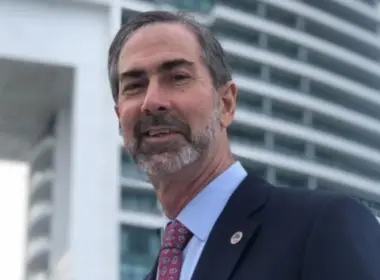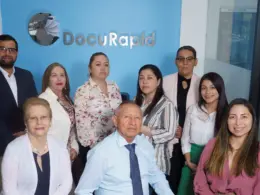Mana Tech’s immersive approach to bringing Latin American startups to the U.S. market
By J.P. Faber
When Charly Esnal co-founded Base Miami with two other partners in 2019, its mission was the same as it is today: to accelerate the learning curve for Latin American tech companies that want to enter the U.S. market or raise capital here. Since then, Esnal’s firm has worked with more than 150 companies, many with notable success stories – Brazilian company Digibee, for example, which raised $25 million and now has offices in Broward County to expand its platform of connecting new digital applications with legacy software systems.
In April of last year, Base Miami took a major step forward, merging with Mana Tech, a division of billionaire Moishe Mana’s neighborhood revitalization platform, Mana Common. Mana, the largest private landowner in Miami, with over 75 properties across Miami’s Flagler District and Wynwood Arts District, saw Base Miami as another useful tool in growing Miami’s tech community.

“Mana Tech and Base Miami are at the forefront of solidifying Miami’s position as an international tech hub by helping these young companies expand into the U.S.,” says Esnal, now head of Mana Tech. “These are the types of cutting-edge companies that will be household names over the next few years.”
Moreover, with the resources available from Mana Common, Mana Tech/Base Miami has expanded its pool of partners – including Latin American governments, which were previously used to identify and sponsor the tech companies nurtured by Esnal and his colleagues. “We had been a straight consulting model, and I was bootstrapping everything, getting government sponsors,” says Esnal. “I had a big vision, and now with Moishe’s support, we can accelerate the mission.”
This year, for the first time, Mana Tech is bringing 15 Latin American startups to Miami, part of a 30-day program that begins with online coaching and culminates with Miami Immersion Week. During that week, the startups go through an in-person bootcamp that ends with a “pitch day” in which the companies pitch their ideas to a panel of tech experts. The winner is then provided with free space, ongoing business and strategy mentoring, and nomination to the Microsoft for Startups Program.
Esnal is quick to point out that while the companies they are vetting are technically “startups” in the U.S., no candidates are considered unless they already have a track record in their home countries. “We say that any entrepreneur that is able to start a company in Latin America, with no resources and a lot of obstacles – that if you bring them to the U.S. market, with its stability, and with the resources of funding, they can really accelerate their growth.”
As for the companies that do not win the honor of first place, the learning experience should prove catalytic. During their week here, the company principals are introduced to mentors, investors, potential partners, etc. “It’s very strategic. We dress the bride and make sure they have all their ducks in a row before coming here,” says Esnal. “We want them to come to Miami, but some realize they aren’t ready for the U.S. market. It’s whatever is best for the founders.” In some cases, the firms are more interested in using Miami as a base for Latin America, “so they can become trans-Latin companies.”
That notion of trans-Latinism is at the heart of the vision not only for Mana Tech, but for all of the divisions that comprise Mana Common, which includes Mana Properties, Mana Commerce, Mana Culture (fashion), Mana Impact (social platforms), and Mana Tech.
“Mana Common is not a development project,” says Mana, despite his soon-to-be-unveiled plans to transform both the downtown and Wynwood areas with a dramatic architectural makeover. “It’s really an infrastructure. It’s a platform to connect Latin America to North America economically through Miami…. Miami really should be the Western Hemisphere’s global hub.” Mana’s long-term vision, he says, is nothing less than the unification of the hemisphere as one economic unit. “The future of the Americas is that it must be one, with 1.1 billion people [combined]…. The way to go is connecting these economies and making one economy.”
“This is just what I am doing with the Mana Tech initiative– uniting the Americas into one market,” says Esnal. “If we united the U.S. with Latin America, we could move all manufacturing here. And if someone wants to do business in LatAm, they come to Miami, the trade hub for the Americas.”
In the meantime, 15 companies will pitch Mana Tech for the honor of prime position, firms that range from platforms that facilitate the transfer of funds between the U.S. and Latin American countries, to AI-based solutions that boost productivity in large corporations. All had to pay $4,000 each toward their expenses to qualify as a scale-up rather than merely an idea.
What follows were the four finalists;
THE CONTESTANTS
COMPANY: SUPLAIT

CEO: CAMILO SILVA CAVIEDES
DESCRIPTION: Suplait enables medium-sized businesses to transform their manual and inefficient procurement processes into an automated and smooth experience, generating savings, increasing visibility, and taking control of their purchasing operations through a conversational, accessible, and easy-to-use platform.
WEBSITE: suplait.com
YEAR FOUNDED: 2022
BACKGROUND: The first startup Silva was part of (leading over 450 people, scaling the project to Chile, Colombia, and the U.S.) now delivers food with adorable robots in the U.S. and Middle East (www.kiwibot.com). He then founded a travel tech startup that simplified the process of booking tours and activities with local operators in Latin America. He had operations in five countries, but when the pandemic hit he had to pivot drastically.
GOAL: Today, Suplait is building a network platform with the vision of connecting all Latin American companies to simplify B2B transactions on a continent with over 18 million businesses that still do not use technology in their B2B purchases. Its purpose is to build the largest B2B trade network in Latin America.
COMPANY: MV SALES & LOGISTICS

CEO: PEDRO PERONI
DESCRIPTION: Today, companies suffer with their field sales forces and transporters. MV Sales & Logistics makes things easier for companies. Its platform automates, controls, and generates real-time field data for their sales and transporter teams in one single solution, and with the possibility to be integrated with any ERP (enterprise resource planning) provider.
YEAR FOUNDED: 2018
WEBSITE: mvsalesandlogistics.com
BACKGROUND: Previously, Pedro worked as an international sales director for FOX 5 New York and then at IE Business School in the markets of LatAm, the EU, and the Gulf region. He graduated with an MBA from IE Business School in Spain and has a bachelor’s degree in international business from EAFIT University in Colombia.
GOAL: “We want to grow in the U.S. market, helping U.S. Latin owners in the distribution sector to grow their businesses and experience in the Latin American market, helping over 4,000 users to improve their sales and logistics processes.”
COMPANY: SLIK

CEO: JAVIER BRIGNONE
DESCRIPTION: Slik provides companies with cloud-based surveys and analytics to measure and improve their employee happiness and overall business performance. Unlike other solutions, Slik uses data science to link employee happiness to business outcomes to show a clear ROI on HR initiatives.
YEAR FOUNDED: 2019
WEBSITE: slikpro.com/en/home-en
BACKGROUND: Brignone is an HR professional with a strong focus on business and technology. He spent most of his career managing teams at a senior executive level in Latin America and continues to create new technologies for HR. Today with Slik, he is helping organizations across multiple countries to improve their employee experience through data science. Slik has recently shown how one of its clients achieved seven percent more in revenue by increasing employee engagement by one percent.
GOAL: With more than 50 enterprise clients in LatAm and Spain, including Starbucks and Burger King, Slik is now looking forward to expanding into the U.S. market.
COMPANY: DAMAP

CEO: FEDERICO ZUBIA
DESCRIPTION: As businesses grow, the number of transactions they need to reconcile – from sources like banks, cards, and gateway payments – also increases. This can be a daunting task for finance teams already stretched thin. DaMap created a data platform to automate the financial reconciliation process, reducing tasks normally taking days or weeks to a few minutes per month, in the process saving time, reducing errors, and optimizing financial operations.
YEAR FOUNDED: 2020
WEBSITE: damap.tech
BACKGROUND: CEO Federico Zubía is a finance and banking expert with a deep knowledge of databases and Big Data. He has worked as a consultant for top companies like Johnson & Johnson, McDonald’s, MSD, and MAPFRE, where he learned the value of staying ahead of the curve.
GOAL: DaMap’s goal is to grow by 500 percent per year in the quantity of transactions processed, becoming the most relevant software reconciliation platform in America in eight years. By providing a solution that simplifies financial reconciliation, it can empower companies to focus on growing their business and achieving their goals.
The winner was: SUPLAIT












